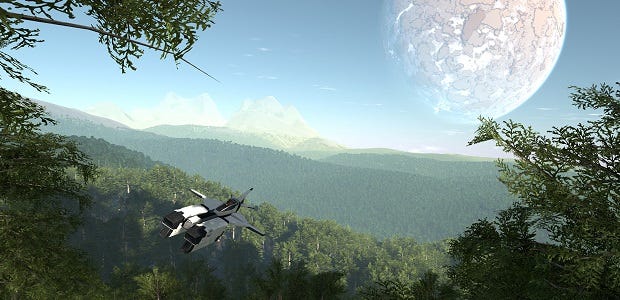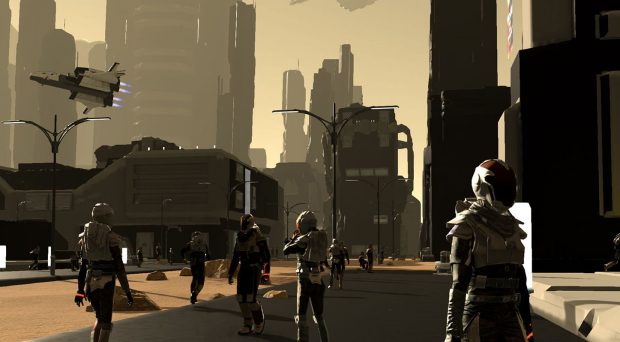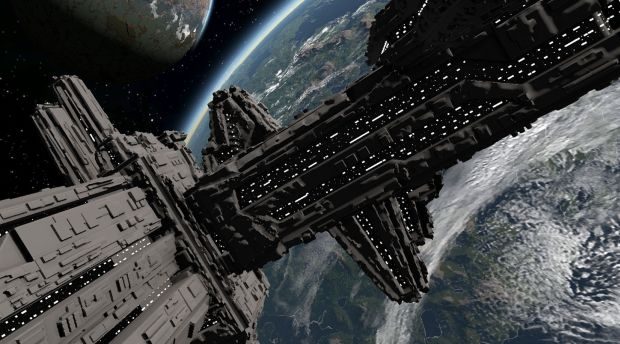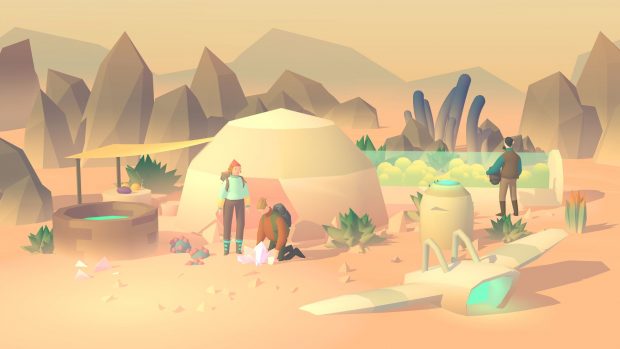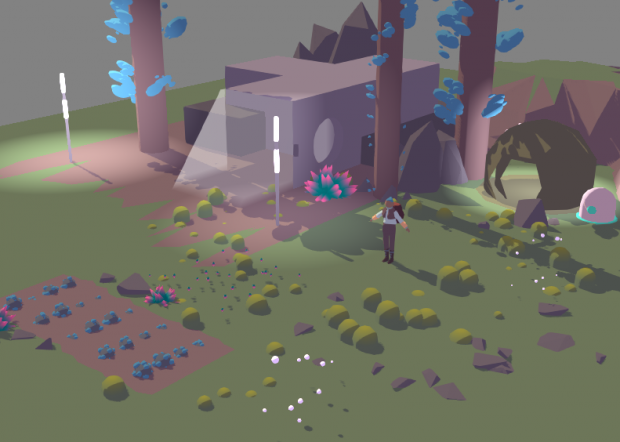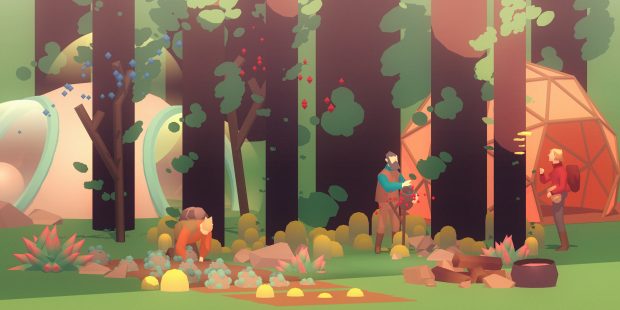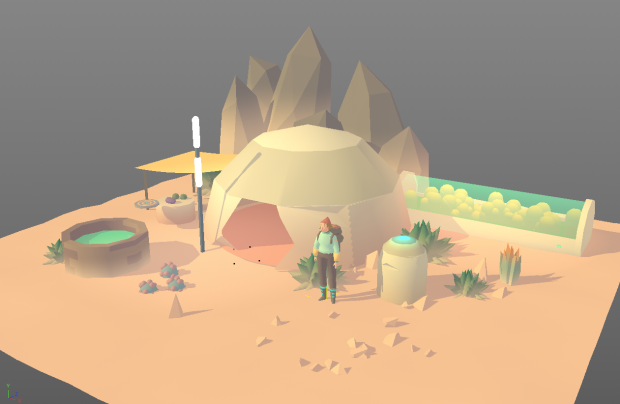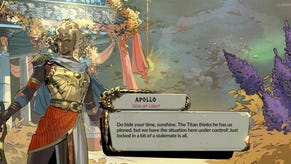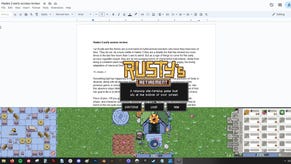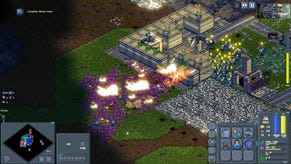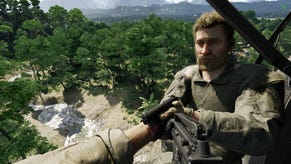The games chasing EVE’s vision of a single shard MMO
Big talk
The planet is full of aimless people. Dozens of non-descript robots silently going to and fro, with no discernable purpose or meaning. Yes, I’m at Gamescom, the annual gaming conference in Germany, but I’m not talking about the visitors on the show floor. I’m talking about the on-screen player bots of Dual Universe [official site], a sci-fi survival MMO making big promises about player numbers and control.
“This is going to be unlike anything else you’ve ever seen before,” says Jean-Christophe Baillie, founder of studio NovaQuark, “because it’s a giant sandbox shared by everyone at the same time where they can build everything they want.”
Like nothing I've ever seen before. That’s something I’m hearing a lot these days.
On-screen, the robotic men continue to congregate, an example, says Baillie, of the game coping with having many players in the same place at the same time. Dual Universe will be able to do this even with thousands of players, he says, implementing what game designers call a “single shard”. This is when MMOs have one world in which all players inhabit, rather than splitting players up with multiple servers or using instancing to lighten the load, like in Elite Dangerous. If you’ve ever sold some cheap lasers on the stock market of EVE Online, or read about the endless player-driven conflicts there, then you already know about the most successful single shard game.
“It’s not very original,” admits Baillie, “it’s an old idea this game – people really want a world you can entirely control, where everything is possible in terms of content creation and in terms of stories – you can experience any kind of story... you can be an explorer, you can be a politician, you can be an industrialist, you can be a miner, you can be... I don’t know – you can dig a hole 2km into the ground and live like a hermit.”
With this, EVE is an inspiration but it isn’t the only one. Dual Universe is a first-person survival game in that you’ll need to collect and mine resources on the surface of a planet, which you’ll use to build a ship and explore a solar system (there’ll be twelve planets initially but expansion is likely). You can create bases, hoverbikes, spacecraft, or even large space stations. Baillie shows me one of these space stations hanging in the sky, then zooms up to it later in an all-seeing ‘god mode’. It’s gargantuan, created using editing tools rather than manpower. But he insists it’s something that could be feasibly built in-game over time. It reminds me of Empyrion: Galactic Survival, one of the better multiplayer lost-in-space games of recent years.
“Yeah, but this is a standard MMO,” says Baillie when I mention the server-based survival game. “I’m interested because there’s only one thing that looks like what an MMO should be on the market, it’s EVE Online. And the rest... there are some game mechanics that are interesting, but... it’s incomparable because of the emergent gameplay and the ecosystem effects. When I build a spaceship, it has meaning – because I’m going to sell it, if it’s successful I’m going to get rich in the game, I’m going to get famous, so it’s not just I do something on my side and that’s it. It’s all part of a collective story, and that’s very big difference.”
But even EVE Online has its limitations. Whenever thousands of players get together in one solar system, for example, the server is forced to enter an ultra slow-motion state, meaning the most infamous battles of EVE’s history have lasted almost entire days. I ask if it’ll be similarly hard for Dual Universe and its server tech to keep up its level of fidelity when there are thousands of people playing.
“No. That’s what we do. That’s our technology. That’s what we advertised that is going to be... a major change in gaming, I think.”
Baillie shows off some more of the world, mentioning more planned features. He digs up some of the surface of the planet, creating a hole that will exist for “everyone, everywhere”. He clambers into a spaceship and flies around taking in the trees and a large tower-like structure. He takes me to the moon orbiting the planet. But probably the most interesting thing is when he throws some building blocks together and drags glowing lines between a button and a door. Now, when he presses the button the door opens. This simple way of connecting lasers, buttons, pressure plates, doors, engines, thrusters, forcefields and other components can be used to make all sorts of riddlesome bases or daft cruisers. Here's an earlier video showing some of the same principles.
Then Baillie opens a panel on one of the ships and shows me a screen with some scatterings of Lua programming language. If you know how to use this, you can program your ship to do things automatically, such as correct its trajectory if it’s about to hit the earth, or retract its landing gear shortly after take off.
“If you know Lua you can do anything you want – not only in the spaceship controls by the way, but you can also make contraptions... screens in which you can have anything displayed… games!”
One of the team’s programmers made the classic brick basher Breakout in-game, he tells me. But even so, there are limits to the use of Lua. Combat actions won’t be programmable, for instance, and other under-the-hood stuff will likewise be off-limits. NovaQuark don’t want it to become a competitive hacking game. But it will be competitive, because outside of a starting area where violence isn’t possible, the planets are divided into small hexagonal territories. These can be claimed with an expensive device which allows the owner and only the owner to edit that area of the planet. If you’re someone who covets that land, you’ll need to control some of the turf adjacent to it before you can take it. But this strategic layer of hexy warmongering hasn’t been fully fleshed out yet. But however it works, says Baillie, it’s important that there be a motive for players to attack – money, resources, power.
“It’s not going to be like I just walk around and I see a territory and I take it – no. It’s going to be a big military operation to do that, so it has to be something meaningful – why do you do that? Is there resources, is there a strategic position that you’re trying to acquire? So that’s why we want people to get into thinking strategically, not just doing things because you can.”
It sounds great. A first-person EVE Online with survival elements. But it’s not yet in a playable state. There’ll be a “pre-alpha” release in September for its original backers, says Baillie, adopting a word that makes my brain feel greasy (what Greek letter comes before “alpha”?) and an early access version is due in 2018. Most significantly, all the biggest boasts and aims – about the technology, about the game design – haven’t been truly tested. A hundred robots walking around in a predictable way on the surface of a grassy meadow is not the same as tens of thousands of human players mashing every button on your game’s dashboard at once, actively trying to break your shit.
Perhaps years ago we journos could have described it as “promising” or “daring”. But in world where a simple mention of No Man’s Sky provokes groans of both ire and sympathy, where Star Citizen seems less interesting with each passing year that it remains unreleased, I feel obliged more than ever to apply that healthy skepticism that we in the games press should have been harbouring all along.
“We try to avoid over-expectation and all these issues we are seeing, especially recently, so we’re trying to be transparent,” says Baillie, mentioning their monthly development diary. “That’s what we do – you may think it’s not enough, OK sorry – that’s what we’re doing. We have big plans for the future, give us some time and we’re going to get there...”
NovaQuark are aiming high, and apart from that one caveat, much of what Baillie says to me is as hyperbolic as it is familiar (“this is absolutely unique... and completely different from any other game you’ve seen”). Whether they are successful or not, they do appear to be making a game that everybody wants to play, pursuing the single shard dream which only EVE has managed with any reliability in recent years. But they aren’t the only ones chasing that dragon.
Planting a Seed
The camp is full of little people. They wander to and fro, doing their allotted tasks. This is Seed [official site], an MMO colony builder that’s still very early in development (and no connection to the 2006 game of the same name). It could be described as “Rimworld but multiplayer” or maybe “The Sims but on another planet where the other Sims families don’t like you”. I’m only presented with a video demo for now. The tiny polygonal folk move robotically, just like the testbots of Dual Universe, but they aren’t aimless.
“These characters should wake up soon,” says Mundi Vondi, one of the co-founders of Klang, the studio behind the game. “So yeah now he’s set up a little camp, she’s doing some farming, he’s lighting a fire...”
As the player, you’ll have a family of up to ten characters - a Crusoe-like clan who crash down on a fresh and habitable planet 1000 years after Earth’s demise. Each AI-controlled family member can be given priorities or directly tasked with something, like cutting down all the trees in an area or painting a house. You can band together with other families – players, in other words - to form large colonies, where groups can form their own small governments, make rules or set taxes. Or you can start off in the wilderness of this planet by yourself, although Vondi says this is “not reccommended for new players”. Because conflict is again part of this new frontier, and once again, it is all happening on a single shard.
“I think to begin with it will be very chaotic and bloody and people are going to be just like... burning everything down and destroying each other,” he says. “But then out of those... out of that chaos... that’s the hole that a more sophisticated civilised community arises, that benefits from the order and kind of like... ultimately calms down a lot of that chaos.”
Exactly how combat or warring will work isn’t fully explained. From the demo it looks to be firmly a managerial game. The family is crowding around a ghostly outline of a planned house, slowly building the walls and windows and door frames and floor. Each of these people will have needs and relationships, says Vondi. Some of them might be unhappy because they have had their heart broken by a character from another player’s family. Some of them might go to the bar and get into a fight with someone from their own colony. Klang don’t just want the basics of Maslow’s hierarchy of needs – food, shelter and safety - they want discord and challenge to arise from a lack of love or entertainment too.
“Rimworld and Dwarf Fortress are kind of like the games in this genre that are most noticeable. I guess Oxygen Not Included as well. But it’s like a very exciting genre and there isn’t really... There’s no multiplayer version of it, so that’s where we’re kind of coming from.”
But EVE Online is also (once again) a talking point. This time, two of Vondi’s co-founders have actually worked on the infamous interstellar war simulator, each of them with CCP for eight years.
“So in EVE obviously they had wars with thousands of players fighting and whenever that would happen it would just ripple across the entire games industry and game world and you’d hear about it… EVE is very hardcore, but it offers an amazing experience, and amazing stories come out of that, and I think we can all agree we’d love to be a part of that but we just can’t all afford the time to be there. So we’re trying to open that up and offer that experience to a wider audience, is one of the goals. So we’ve got also some inspiration from Sims...”
They’re hoping to make the tribal disagreements of Seed more noob-friendly, in other words. Unless you aim to start off your own colony (again: not recommended) you’ll be asked to pick from an existing band of players right at the start, to throw your lot in with a crowd of players who may already be veterans of the planet. Those colonies might have loops of activity in place to ensure everyone is supplied with food and so on – an advantage in a world where your family members will continue to go about their day even if you as the overseer haven’t logged in.
“I mean if you leave them with nothing in the forest and you go away for a week,” says Vondi, “you’re probably going to come back to them being dead, but if you have a nice house and you’re collaborating with other players who are all building this cute little village together, your characters are working and you’ve kind of made sure that there’s a loop in there which completes their food needs and where they sleep and all that, you might come back and they’re just super happy and fine.”
Seed is being built with something called Spatial OS. It’s the same technology behind Worlds Adrift, another MMO of airships and grappling hooks (something I’ve previously written about). Like the crowd behind Dual Universe these developers are not shy of hyperbole. One of the lines on Seed’s website says: “Every move, thought, or decision made by a player will have a knock-on effect and impact the colonization and overall structure of the planet.” It's unusual to see a game's promotional material claiming that their town-planning sim can be affected by mere thoughts. But what they mean, Vondi tells me, is that the game will hit player colonies with sizeable environmental problems, should the humans start to harvest resources and become industrially unsustainable. I ask him if maybe, just maybe, they are being a little too ambitious. He laughs.
“To start off with – probably yeah, too ambitious. And a lot of these things, a lot of these features that we want to do, come after we launch so... on launch it’s very focused on basic survival, building small little towns, making them function and then as the game grows, we will add mass transit and rockets to harvest meteors or whatever – we have an infinite scope, and that’s the kind of landscape that we’re coming from of course, that me and my colleagues have come, from EVE – still in development after fifteen years.
“How far we go into global warming or whatever is yet to be seen; I think maybe those kind of elements don’t necessarily have to be there on launch because those are like really grand scale effects and we can add that in as an update down the line."
These are familiar sounding goals. As far back as 2003, Wurm Online promised that its settlers would have finite resources and that problems would arise for any server population that over-farmed. Seed doesn’t go that far. Resources will regenerate, trees regrow and mines may offer rock or fossil fuels at a similarly regenerative rate. But that pitch remains - “grand scale” effects, self-policing communities, thousands of players on the same world.
Klang (and others) have faith that the technology they’re using can handle that load. As with Dual Universe, it’s big talk. But the fact remains: I still haven’t seen a finished product with masses of players putting significant stress on a game like this without causing problems. Even in Worlds Adrift - the airship MMO running on the same technology - the physics janks out, it chugs to a grinding FPS rate, and crashes frequently occur. That’s maybe to be expected in any early access game but it does demonstrate that this particular recurring boast – thousands of players interacting in a continuous single shard - still needs to be proven.
Like Dual Universe, the greener, brighter Seed is also pre-Greek alphabet. Klang’s video of a skeletal management game with work-in-progress models and UI may be a good pitch (it’s certainly interesting to a Rimworld fan such as myself) but you can’t prove the potential of an MMO when the whole world is devoid of players and instead populated with robots. You can talk about farms, colonies, attacks, defences, trade deals, resource grabs, monopolies, cold wars and the simulation of any other kind of industrial revolution or societal collapse, but as promising and intriguing as the technology looks, it remains largely unproven.
And that pre-release criticism extends to any other game that blurted out its own praises in the halls of Gamescom last week. In this post-N* M*** S** era, when many other developers seem to be toning down their rhetoric (if only a smidgen), huge promises like “every thought simulated” or “you can make a space station thousands of kilometres large” almost seem designed to court skepticism. I look at the mingling robots of Dual Universe and Seed and want to think: cool, this is something people should get into. But all that comes is a desire for perspective and calm, for less boundless enthusiasm and more explanation of a game’s likely limits. Ambition is good, and without it, it’s unlikely EVE Online would have been made. But even EVE Online knows when to slow things down.
